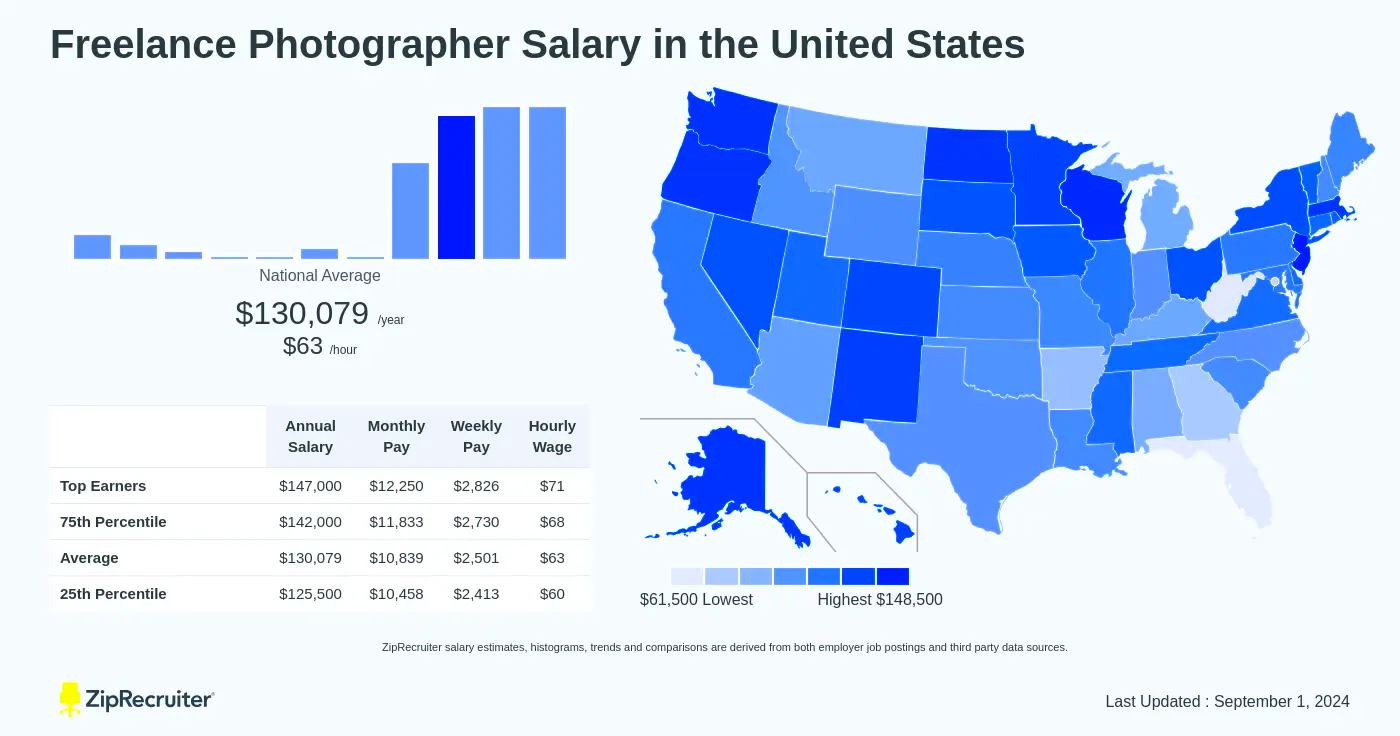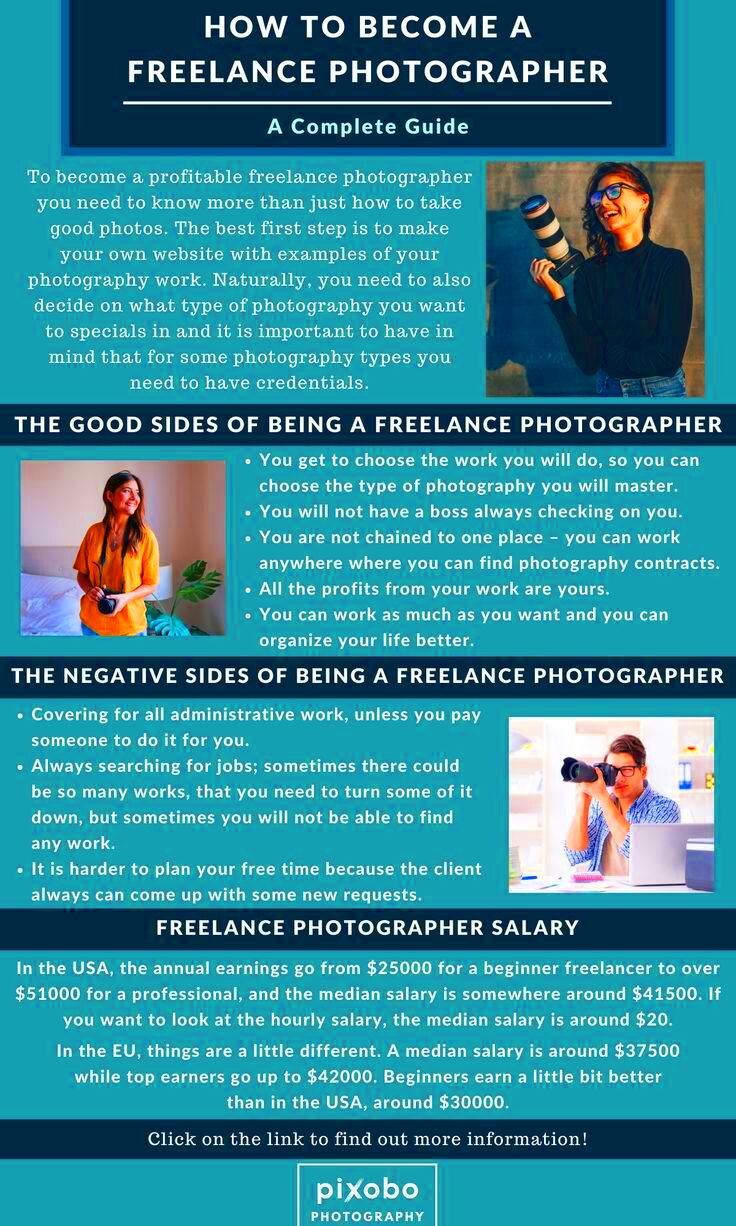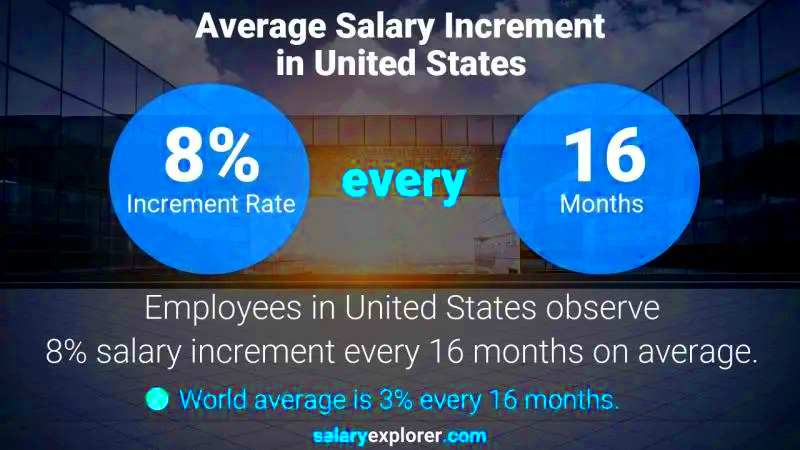Freelance photography is an exciting career, offering flexibility and creative freedom. However, when it comes to annual earnings, there is no one-size-fits-all answer. The income of freelance photographers can vary significantly depending on several factors, including their niche, experience, and business strategy. Some photographers make a comfortable living, while others may struggle to reach their financial goals. Understanding how earnings are structured can help photographers set realistic expectations and plan their careers effectively. In this blog, we will explore the key factors that influence a freelance photographer's annual income and provide insights on maximizing earnings.
Factors That Influence the Earnings of Freelance Photographers

The annual earnings of a freelance photographer depend on multiple elements. Here are some of the key factors that play a role:
- Location: The cost of living and demand for photography services in a photographer’s location can affect their earnings. Photographers in big cities with high demand may charge more for their services than those in smaller towns.
- Niche: Some photography niches, like weddings or commercial photography, tend to be more lucrative than others, such as portrait or event photography. The more specialized the niche, the higher the potential income.
- Client Type: Freelancers working with high-end clients or large corporations typically earn more than those working with smaller businesses or individuals.
- Marketing and Networking: Photographers who actively promote their services and network with potential clients are more likely to find higher-paying opportunities.
- Reputation and Portfolio: A strong portfolio and positive client reviews can help photographers command higher rates and attract better-paying clients.
Also Read This: How to Find Requested Gigs on Fiverr
How the Experience Level Affects Freelance Photography Income

Experience is one of the most influential factors in determining a freelance photographer’s income. As a photographer gains more experience, they become more skilled and can command higher rates for their work. Here's how experience plays a role:
- Entry-Level Photographers: New freelancers often start with lower rates as they build their portfolio and gain exposure. They may focus on gaining experience and attracting clients to establish their reputation.
- Mid-Level Photographers: After a few years of work, photographers start to understand the business side of freelancing and may raise their rates. They often work with a broader range of clients and have a more refined portfolio.
- Experienced Photographers: Seasoned photographers can often charge premium rates due to their extensive experience, well-developed skills, and established reputation. They may work with high-profile clients and handle larger, more lucrative projects.
In addition, experienced photographers often have more efficient workflows and may be able to take on more projects, leading to increased earnings. However, it’s important to note that experience doesn’t only mean the number of years worked but also the quality of work produced and the photographer’s ability to manage a business.
Also Read This: How to Change Fiverr Verification Code Phone Number
Popular Photography Niches and Their Income Potential

In freelance photography, the niche you choose can greatly affect your annual income. Different photography niches offer different income opportunities based on demand, specialization, and client budgets. Here’s a breakdown of some popular photography niches and their potential earnings:
- Wedding Photography: One of the most lucrative niches in freelance photography, wedding photographers can charge anywhere from $1,500 to $10,000 or more, depending on the location and package offered. This niche requires excellent customer service and the ability to capture important moments under high pressure.
- Commercial Photography: Commercial photographers work with businesses to create images for advertising, product promotion, and branding. This niche can be highly profitable, with rates ranging from $2,000 to $20,000 per project depending on the scope and client.
- Portrait Photography: Portrait photographers typically charge between $150 and $500 per session, depending on their experience and the type of clients they serve. While it can be less lucrative than wedding or commercial photography, it offers steady work.
- Real Estate Photography: With the rise of online listings, real estate photography is in demand. Photographers in this niche can charge from $100 to $500 per shoot, with the potential for recurring work from agents and developers.
- Event Photography: Event photographers capture moments at parties, corporate events, and festivals. They typically charge between $500 to $3,000 depending on the event size and duration.
Choosing the right niche depends on your interests, skill set, and market demand. Specializing in a particular type of photography can lead to higher rates and more consistent work over time.
Also Read This: Photographic Palette: Changing the Color of a Photo in Canva
Pricing Strategies for Freelance Photographers
Setting the right price for your photography services is crucial to maintaining a successful freelance career. Your rates should reflect your experience, niche, and the value you provide to your clients. Here are some pricing strategies to consider:
- Hourly Rate: Charging by the hour is a straightforward approach, especially for smaller projects. Depending on your location and experience, rates typically range from $50 to $200 per hour.
- Per Project Rate: This is a common pricing model for weddings, commercial shoots, and large events. For example, wedding photographers may charge a flat rate of $2,000 to $5,000 per event, including travel, editing, and prints.
- Package Pricing: Offering different packages (e.g., basic, standard, premium) is an excellent way to give clients options. Each package can include varying levels of service, such as additional photos, prints, or photo albums, and can help increase overall revenue.
- Licensing Fees: For photographers working in commercial photography, licensing fees may be charged for the usage of images. These can be charged as one-time fees or on an ongoing basis if the image is used for a long-term campaign or distributed to multiple channels.
In addition to setting competitive prices, it’s important to consider factors like travel, equipment costs, and post-production work when calculating your rates. Be sure to review your pricing regularly and adjust it based on demand, experience, and market trends.
Also Read This: How to Reply to Buyers’ Requests on Fiverr
Managing Income as a Freelance Photographer
As a freelance photographer, your income can fluctuate, making it essential to manage your finances wisely. Good money management practices will help you stay financially secure throughout the year. Here are some tips to help you manage your income:
- Track Your Earnings: Use accounting software or spreadsheets to keep track of all your income sources. This helps ensure you don’t miss payments and provides clarity on which services are generating the most revenue.
- Save for Taxes: Unlike salaried employees, freelancers are responsible for paying their own taxes. Set aside 20-30% of your earnings for tax purposes to avoid surprises when tax season arrives.
- Set a Budget: Creating a budget is key to controlling your expenses. Factor in costs like camera equipment, software subscriptions, marketing, and business-related travel. Sticking to a budget helps ensure your business remains profitable.
- Build an Emergency Fund: As income can vary, it’s important to have an emergency fund to cover months when business is slow. A good rule of thumb is to save enough to cover at least three to six months of living expenses.
- Plan for Slow Periods: Freelancers often experience seasonal fluctuations. For instance, wedding photographers may see a decline in business during the winter months. Make sure you plan for these slower times by saving extra during peak seasons.
By keeping track of your income, saving for taxes, and budgeting properly, you can better handle the ups and downs of freelance photography and maintain a healthy financial balance.
Also Read This: Top 10 Book Translators on Fiverr
How to Increase Your Earnings as a Freelance Photographer
As a freelance photographer, increasing your earnings often requires a mix of skill improvement, business strategies, and networking. While talent is important, how you manage and grow your photography business can make a big difference in your income. Here are some effective ways to boost your earnings:
- Specialize in High-Demand Niches: Specializing in lucrative niches like weddings, commercial, or real estate photography can help you command higher rates. These areas often have more consistent demand, allowing you to charge more for your expertise.
- Raise Your Rates Gradually: As you gain experience, raise your rates to reflect your growing skill set. Don’t be afraid to charge more as your portfolio and reputation improve, especially when working with repeat clients who trust you.
- Offer Add-Ons and Packages: Many clients will appreciate additional services like photo albums, extra prints, or faster delivery. By offering package deals or add-ons, you can increase your overall earnings without significantly increasing your workload.
- Network and Build Relationships: Word-of-mouth referrals are one of the best ways to find high-paying clients. Attend local events, connect with businesses, and join online communities to expand your network.
- Expand Your Skill Set: Learn new photography techniques or editing styles to stay competitive. Additionally, mastering skills like lighting, retouching, and social media marketing can help you offer more value to clients, justifying higher rates.
- Market Yourself Effectively: Build a strong online presence with a professional website and active social media profiles. Create content that showcases your skills and attracts new clients. Consider paid advertising or collaborations with other businesses to expand your reach.
Increasing your earnings as a freelance photographer is about working smarter and positioning yourself as a valuable asset to your clients. With the right approach, you can grow your income steadily while doing what you love.
Also Read This: How to Change Your Username on Fiverr
FAQ: Common Questions About Freelance Photography Earnings
Freelance photography earnings can be confusing, especially if you’re just starting. Here are some of the most common questions photographers ask about their income:
- How much should I charge as a freelance photographer? Your rates should reflect your experience, niche, and location. Start by researching rates in your area and adjusting based on your skill level and the complexity of the project.
- How do I get consistent work? Consistency comes from building a strong portfolio, networking, and maintaining good client relationships. Don’t be afraid to ask for referrals or repeat business.
- Can I make a full-time income as a freelance photographer? Yes, many photographers earn a full-time income by working on multiple projects, diversifying their niches, and managing their business efficiently. Success will take time and persistence, but it’s certainly achievable.
- How do taxes work for freelance photographers? Freelance photographers are considered self-employed, so you’ll need to pay self-employment taxes. It's important to keep track of all income and expenses and set aside money for taxes. Consider hiring an accountant for advice.
- Should I offer discounts to attract clients? While offering discounts can attract business initially, it’s not always the best long-term strategy. Instead, focus on the value you offer and emphasize your expertise. Consider offering discounts for repeat business or package deals instead.
By addressing these questions, you can better navigate the financial side of freelance photography and set yourself up for success.
Conclusion: Final Thoughts on Freelance Photography Income
Freelance photography offers many opportunities for creative individuals, but it also comes with its own set of challenges, especially when it comes to managing your income. By understanding the factors that affect your earnings, setting fair prices, and finding ways to increase your income, you can build a sustainable and profitable career. Remember, success in freelance photography doesn’t happen overnight. It requires a combination of skill, business savvy, and patience. Focus on improving your craft, networking, and managing your finances wisely, and you’ll see your income grow over time.
In the end, freelance photography is as much about entrepreneurship as it is about photography. With determination and the right strategies, you can turn your passion into a rewarding business.




